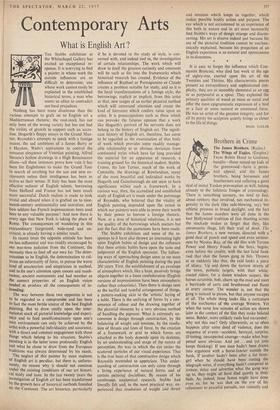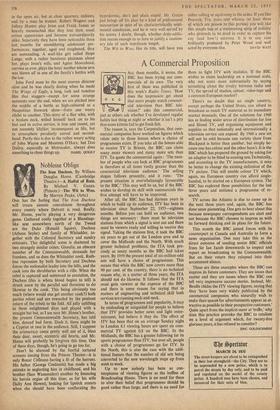Brothers in Crime
The James Brothers. (Rialto.) The Wings of Eagles. (Empire.) FROM Robin Hood to Giuliano, bandits—those mixed-up kids of the greenwood—have a peren- nial appeal; and the James brothers, being horsemen and Southerners.and suffering a good deal of initial Yankee provocation as well, belong already to the folkloric fringes of criminology. There is something savoury, we tend to feel, about robbery that involved, not mechanical in- genuity in the dark (like safe-blowing, say), but athletic prowess in broad daylight, and the fact that the James murders were all done in the best Hollywood tradition of fast shooting across the stockade makes us forget that they, like unromantic thugs, left their trail of dead. The James Brothers, a new version, directed with a good deal of punch and speed and even serious- ness by Nicolas Ray, of the old film with Tyrone Power and Henry Fonda as the boys, begins, even before the credits, with the last fatal bank raid that shot the James gang to bits. Thrown at us suddenly like that, the raid looks a piece of idiocy. Up and down the narrow streets of the town, pathetic targets, with their white- coated riders, for a dozen window snipers, the horses scramble, bolt, churn up the mud and meet a barricade of carts and brushwood and flame at every corner. The wonder is, not that the gang is minced to pieces, but that anyone escapes at all. The whole thing looks like a caricature of the mechanics of -the average Western. Yet when the same few minutes of action are shown later in the context of the film they make belated sense. Bolder, more unlikely raids had succeeded : why not this one? Only afterwards; as so often happens after some deed of violence, does the sequence of events—accident, betrayal, surprise, ill:timing, unsuspected courage—make what hap- pened seem obvious. And yet ... and yet (one keeps thinking). If one man hadn't been drawn into argument with a horse-fancier outside the bank, it another hadn't been after a fat farm- girl when he should have been cutting the telegraph wires, if everything hadn't conspired to irritate, delay and advertise what the gang was up. to, they might all have died quietly in their beds. As, indeed, Jesse James might have done even so, for he was shot on the eve of his retirement to peaceful pursuits, not violently and
in the open air, but at close quarters, indoors, and .by a man he trusted. Robert Wagner and Jeffrey Hunter play Jesse and Frank, James so heavily moustached that they lose their usual screen appearance and become extraordinarily alike. Separately they have been noticeable these last months for smouldering adolescent per- formances; together, aged and toughened, they are outstanding. A waif-like girl called Hope Lange, with a rather luminous plainness about her, plays Jesse's wife, and Agnes Moorehead, corvine as ever, plays the boys' mother whose arm was blown off in one of the family's battles with the law.
John Ford must be the most uneven director alive and he Was clearly dozing when he made The Wings of Eagle, a long, lush and tasteless film that staggers—except for some strange moments near the end, when we are pitched into the middle of a battle as high-coloured as a Neapolitan firework show—from one weary cliche to another. This story of a flier who, with a broken neck, willed himself back on to his feet and to active service, is true and recent, yet not remotely lifelike; inconsequent as life, but in atmosphere peculiarly unreal and second- hand. Partly this is due to the rather weary acting of John Wayne and Maureen O'Hara; but Dan Dailey, especially in Metrocolor, always does something to cheer things up. ISABEL QUIGLY



































 Previous page
Previous page